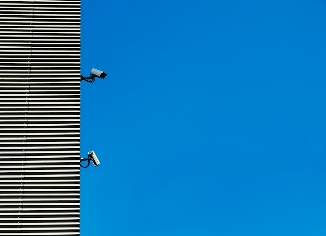Police plan to use facial recognition technology more often this year. An internal review committee will decide whether or not this is permissible in a specific case. Privacy experts are critical of the police's intention. RTL News writes about the new system called FaceF1nder.

The police currently operate a single system equipped with facial recognition technology: CATCH. The system consists of two separate databases: CATCH Criminal and CATCH Aliens. The first database contains profile photos of people -both Dutch and non-EU who are suspected of a criminal offense, or have committed a crime and been convicted of it.
CATCH aliens contains photos and personal data of expatriates, exchange students and asylum seekers who are required to present a visa or residence permit if they want to stay in our country for an extended period of time. This database contains 8 million photos of over 6.5 million people who come from outside the EU and have no convictions on their names. When the Lower House heard about this last year, the outrage was great.
If it is up to the police, CATCH will have a third database next year. In it, the police will store material from suspects who have been captured on video but have not been able to establish their identity.
Then there is the new system FaceF1nder. This allows police to search for faces among large amounts of photos and videos. Police can use the system to study footage and photos captured by dozens of security cameras or confiscated smartphones over a period of several weeks. CATCH is designed to find out who someone is, FaceF1nder is designed to map where someone has been spotted.
Before agents are allowed to use the new facial recognition technology, an internal committee must pass judgment on it. This review committee has not yet approved FaceF1nder in a general sense. To date, the system has been used in only one case to analyze photographic material that was seized. The application to expand CATCH is also pending.
Experts are deeply concerned about our privacy. Vera Prins, Policy Officer Human Rights at Amnesty International, doesn't think police should judge when they should be allowed to use facial recognition technology. Marc Schuilenburg, professor of digital surveillance at Erasmus University Rotterdam, agrees. "We don't know what all the police authorize internally. Do they deploy facial recognition only for serious crimes, or also for traffic violations?" he told RTL News.
"We all want the police to track down criminals and for us to live in a safe Netherlands. But that does not mean that the police should be able to use everything. The risk is that the limit is being stretched further and further," warns researcher Yong Yong Hu, who is a doctoral student at Radboud University Nijmegen. Criminal justice professor and doctoral candidate at the same university Maartje Kouwenberg fears that the use of facial recognition technology risks becoming "a sliding scale.
In a response, the police said the independence of the review board is not in question. "The review committee is not involved in the operational deployment of facial recognition, and has no interest in it," said a police spokesperson. In addition, the chief of police must still give the green light before facial recognition can actually be deployed. The mayor or the district attorney can always decide to refrain from deployment. Finally, a judge can afterwards assess whether the deployment of facial recognition was lawful.

